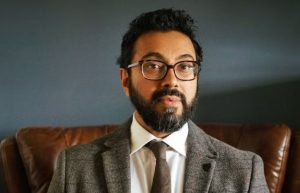Islamophobia report sets out pathway to cohesion
Islamophobia has been on the rise in Australia over the two decades since the September 11 terror attacks and has skyrocketed since the October 7, 2023 terror attack in Israel, the federal government’s Islamophobia envoy has reported.
Handing down his report in Canberra, envoy Aftab Malik said Islamophobia had been “persistent” and “never fully addressed”.
 He said the report “proposes a way forward for the religious protection of all religious communities who have not been afforded this to date”.
He said the report “proposes a way forward for the religious protection of all religious communities who have not been afforded this to date”.
“It is a deeply ingrained societal challenge,” Mr Malik said.
His report, titled ‘A National Response to Islamophobia: A Strategic Framework for Inclusion, Safety and Prosperity’, contained 54 recommendations across every government agency, as well as a foreword by cricketer Usman Khawaja.
The recommendations encompass the inclusion of religion – and particularly Islam – in anti-discrimination laws, reviewing anti-terror laws to determine if they target Muslims and support for capacity building of communities and mechanisms for reporting Islamophobia.
One focus of the report is Muslim women, who comprise the majority of targets of reported incidents of everyday Islamophobia.
It says many have had their hijabs pulled and ripped off and they have been “subjected to foul, disgusting and degrading behaviour”.
The report outlines the depth and extent of Islamophobia.
“The evidence documenting anti-Muslim hate is overwhelming. It is propelled by Muslims being perceived as a national security threat and the perpetuation of negative stereotypes about Islam and Muslims by sections of the media and, regrettably, some of our parliamentarians — both intentionally and, perhaps, inadvertently,” it says.
“These messages have provided a social licence to hate Muslims, with many Muslim Australians speaking of harassment and attacks on mosques following divisive comments by politicians and negative media commentary.
“This has led to their constant ‘othering’, with massive, multiple implications for Muslim Australians that range from mental health to employment and social exclusion,” the report says.
It says the survey consistently reveals a bleak reality for Muslims in Australia.
“Fifty per cent of Australians self-identified as being anti-Muslim in a 10-year study published in 2011, and in 2023, the Australian Cohesion Index revealed that only a quarter of Australians hold a positive view about Muslims,” the report said.
The report’s recommendations urge the federal government to:
*Confront Islamophobia with equivalent urgency to other discriminatory practices, and provide it with the same rights, protections, and legal recourse.
*Formally recognise the International Day to Combat Islamophobia on 15 March, as established by the United Nations General Assembly.
*Help build greater inclusivity into recruitment practices within the Australian Public Service by better understanding barriers that deter minority and diverse communities from applying, and use that insight to design more inclusive recruitment practices.
Mr Malik’s report laid out some critical principles, including:
Accountability and responsibility: holding individuals and institutions accountable for hate speech and discriminatory actions and policies;
Protection and support: ensuring that victims of Islamophobia have accessible support services and that communities feel safe and valued;
Education and awareness: challenge Islamophobia, promote understanding and respectful dialogue through training, media, the arts and education.
“These recommendations aim to engender a fair, respectful and inclusive environment, one that actively combats prejudice and hate, but importantly respects fundamental freedoms,” he said.
Prime Minister Anthony Albanese said the report reflected his pride in Australia.
“We need to nurture social cohesion. We can’t take it for granted. My government does that each and every day. We call out when there are attempts to divide us and we work each and every day to create a more united and stronger Australia,” he said.
“We should be proud, when we look around the world, at what we are achieving here in this great nation of Australia. That doesn’t mean there’s not more work to do. It means that we can’t take it for granted and my government certainly isn’t doing that,” he said.
Read the full report here.












